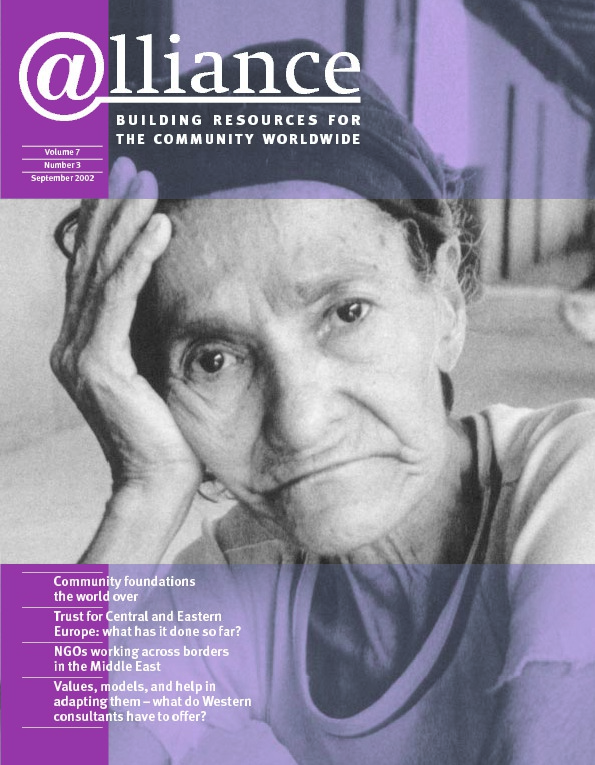The first community foundation in Russia was set up in 1998, in Togliatti, a medium-size city on the Volga with a strong business community and the largest automobile plant in Russia. Community foundations (CFs) now exist in 15 communities in Russia, and more are willing to try out the idea. Four new foundations were established in 2001. Though most CFs in Russia are still in the early stages of development and none of them has a sustainable endowment, it seems that CFs may be on the verge of a breakthrough in terms of companies’ willingness to contribute and participate.
The main factor here is the general improvement in the Russian economy since last year. Companies have now gone through the initial period of capital accumulation and have started to understand that they are part of their communities and that community has a positive influence on their business. In this situation, there is a growing demand for CFs that can offer companies help in spending their charitable budgets more effectively.
Russia’s oldest community foundation thriving
Togliatti Community Foundation is now thriving – it almost trebled its endowment last year, and a growing proportion of its budget comes from local sources[1] – but it took a long time to get off the ground. While interest in the CF concept was strong in the city from the very beginning, it took more than three years to prepare the ground for establishing a CF. It started as an initiative of several local businesses and NGOs, which then received support from the local Rotary Club and Chamber of Commerce. The final step was for the city administration, initially sceptical and reluctant to become involved, to establish a partnership with the Togliatti Community Foundation, which now manages a small grants programme funded by the city.
With local business showing a greater trust in the CF model and a willingness to invest in their communities, external support is no longer crucial to the development of Russian CFs. A recent episode illustrates this growing trust. One of Togliatti’s biggest banks, which had consistently rejected all the CF’s offers of cooperation, suddenly took the initiative and approached the foundation saying that they had been watching its operation for two years and were now ready to join the foundation and become its largest endowment funder.
Success in Pervouralsk
Another success story comes from Pervouralsk, a small city in the Urals with a population of 170,000, where a CF was established in 2001. It has raised more funds locally in a year even than Togliatti, without a single penny from international donors – a Russian record so far. The secret is very simple.
The city has for a long time (even during the Soviet period) had an informal ‘board of the city’s directors’ – an advisory council comprising heads of the biggest local enterprises and the mayor to tackle the city’s most difficult problems. No sooner had this board learned about the CF concept than it adopted it. The board of directors became the CF’s board of trustees, making it one of the fastest-growing CFs in Russia.
Another factor in the CF’s success was a ‘sense of community’ that is very unusual in Russia. When visiting Pervouralsk, it is evident that people of all sorts, from ordinary citizens to heads of enterprises and government officials, love their city and are willing to participate in improving the life of their community. As a result it didn’t require much effort to explain what the CF was about. It was more a matter of combining the existing infrastructure and CF operational practices. In just a year it is evident how much it has influenced the community. Owing to constant cross-sectoral interaction facilitated by the CF, the CF possesses the most up-to-date information on the city’s main problems, which helps it greatly in formulating its grant-giving programmes. Community leaders actively participate in the CF’s events, such as grant programme presentations, grant award ceremonies and charity balls. This is all extremely unusual for Russian cities, which more frequently face tensions between city and regional authorities and rivalry and mutual distrust among local businesses.
On the basis of experience so far, the crucial factors in CF success seem to be the following:
- preparedness of the community to get together to tackle social issues;
- presence of resources;
- a leader able to bring the community leaders together;
- participation of all three sectors.
While we at CAF Russia continue to feel that participation of all sectors is vitally important for Russian CFs, the main emphasis should be on widening business involvement and increasing the presence of business people on CF governing bodies.
1 In the past, over 70 per cent of the grantmaking budget came from local sources but more than 80 per cent of operating costs were supported by international donors. Now 90 per cent of the grantmaking budget comes from local sources and over 50 per cent of operating costs.
Vadim Samorodov is a Programme Manager at CAF Russia. He can be contacted at vsamorodov@cafrussia.ru
See http://www.cafrussia.ru or http://www.cafonline.org


Comments (0)